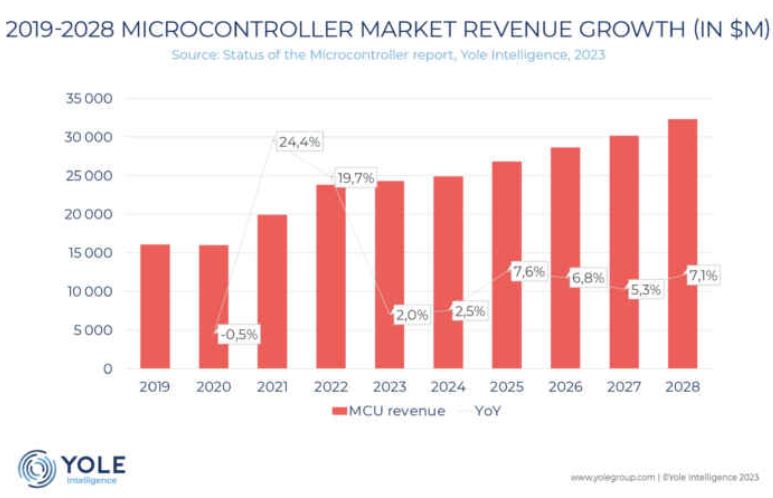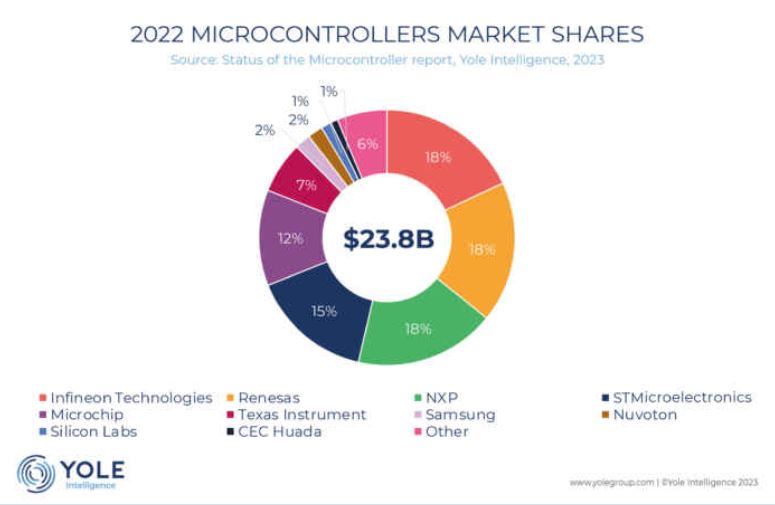Date: 07/11/2023
The microcontroller market to reach US$32 billion by 2028 driven by automotive
MCU revenue is expected to reach US$32 billion in 2028, with a 5.2% CAGR between 2022 and 2028.
A strong rise is seen in mainland China. China is the incubator of emerging chip designers.
Energy efficiency remains the central attribute, alongside a push for elevated performance.
Infineon Technologies, Renesas, and NXP are engaged in close competition, with minimal differences between them: about 18% market share for each leading MCU company.
While 2022 ended on a positive note, the 2023 MCU market is expected to dip in the first half and gradually recover in the second. However, this recovery won’t be enough to prevent a slight overall decline. Replacement cycles from the COVID-19 pandemic-driven buying spikes are expected to persist. Inflation and global conflicts will continue through 2023, but signs of a recession are diminishing, announces Yole Intelligence.
Tom Hachenberg, Principal Analyst, Computing & Software, within the Semiconductor, Memory & Computing division at Yole Intelligence, part of Yole Group said “The overall sentiment points to a small decline in MCU revenue to US$22.9 billion. The short-term forecast is cautious due to ongoing global economic volatility, with inflation expected to decrease slightly, potentially signaling a modest recovery by 2025. MCU revenue is projected to reach about US$32 billion by 2028.”
Global MCU shipments are benefiting from a strong second half of 2023, but the weak first half is expected to lead to a decline to 26.5 billion units. The short-term MCU market for 2022 to 2028 faces uncertainty due to global geopolitics, while long-term demand for MCUs remains strong, driven by automation and connectivity, and is expected to grow to over 36.7 billion units by 2028.

In 2023, the ASP is expected to rise slightly and remain at an all-time high throughout the year. The shift towards higher-priced MCUs due to supply chain disruptions is likely to become the new normal. 4/8/16-bit market share is falling more rapidly than expected, with most growth occurring in the 32-bit segment, driven by RISC-V architecture and a demand for advanced features. By 2028, the 4/8/16-bit market share is expected to drop to less than 33% by revenue.
In the top five MCU market segments, automotive is set to reach almost 39% of the MCU market by revenue in 2023, while industrial & other remains at 24%. In parallel, smartcard/secure MCUs are forecasted to reach 14% due to strong embedded security trends. At the other end, the consumer segment is expected to drop to just above 11%, and personal data processing is at 5% due to low equipment replacement rates.
Vishal Saroha, Technology and Market Analyst in the Semiconductor Memory and Computing Division at Yole Intelligence said “Infineon Technologies, Renesas, and NXP are closely tied as top designers, with NXP dominant in automotive MCUs. MCU suppliers are adapting to COVID-19’s transition to an endemic phase, and smaller suppliers are on the rise, particularly in Asia. Mainland China is a hub for MCU shipments due to electronic device assembly. Government incentives have spurred new MCU startups. Major Chinese OEM s are entering the semiconductor industry, focusing on MCUs for smart home systems, automotive, and AI .”
The competitive landscape remains stable, with a growing number of small suppliers, especially in Asian markets. Major Chinese OEMs have entered the semiconductor industry, with a particular focus on MCU manufacturing. These companies are actively involved in chip design to ensure supply chain control. Furthermore, in-house MCU development enables self-sufficiency. Significant investments have been made to strengthen the positions of these companies, exemplified by BYD Semiconductor, the leading MCU manufacturer in China.
News Source: Yole
Tweet Follow @ecewire

